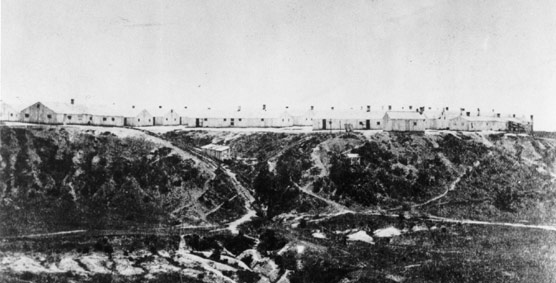Mary Pettigrew
(Tyrrell County)
Featured Character – A Soldier's Life

Chimborazo
Hospital, Richmond, Virginia
Courtesy of the U.S. Library of Congress
Born
on March 12, 1826, Mary Blount Pettigrew’s
mother died giving birth to her sister, Ann Blount Pettigrew. Their father,
Ebenezer
Pettigrew, sent the sisters
to live with their maternal aunt in New Bern. They
attended several ladies’ schools in both New
Bern
and Raleigh. Befitting their status as
future belles of
the southern aristocracy, the sisters studied piano and French. Along with her cousin Mary
Bryan, Mary Blount
Pettigrew left North Carolina
in 1841 to
attend Miss Breschard’s, a noted ladies’ school in Washington,
DC. After graduating, Mary
Blount Pettigrew
became hostess for her widowed father at Magnolia, his plantation along
the
banks of Lake
Phelps.
During the antebellum period, Mary Blount Pettigrew
frequently visited
her Petigru relatives in South Carolina.
Following traditional custom, she even accompanied her
brother Charles
Pettigrew and her cousin Carey Petigru on their honeymoon in Europe.
Upon the outbreak of war, Mary Blount
Pettigrew sought refuge at her cousin’s plantation in upcountry South Carolina. In March 1864, she became
a matron at Chimborazo
military hospital in Richmond. After the war, Mary Blount
Pettigrew lived with
her heavily indebted brother Charles Pettigrew at Bonarva Plantation. Together with her
sister-in-law, she opened a
Sunday school for the freed plantation slaves, but complained about
their “hard
to get on with” attitude. In
June 1868,
Mary Blount Pettigrew married Peter Fielding Browne, an older doctor
she met in
Richmond
during
the war. Although
he purchased Bonarva
from Charles Pettigrew, Browne preferred to live on his Virginian
estate, which
upset his new wife. Forced
to sell
Bonarva in 1880 after her husband’s death, Mary Browne moved into a
small house
with her sister-in-law and three nieces in Plymouth.
Her fortunes destroyed by war and emancipation, Mary
Blount Pettigrew
Browne died almost penniless in 1887.
